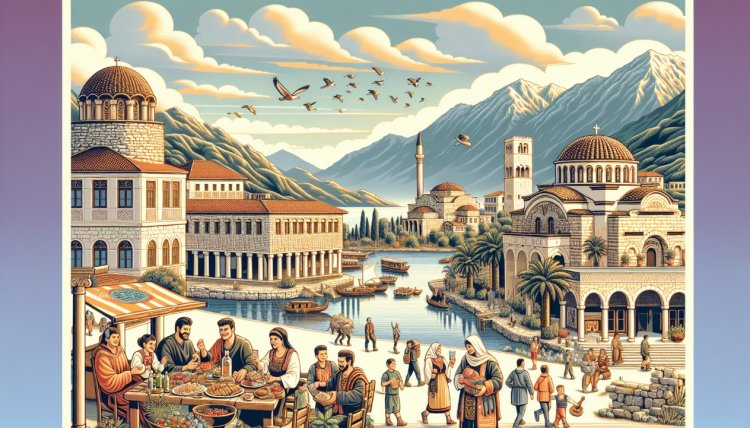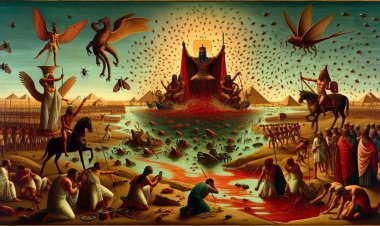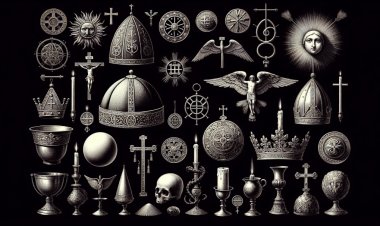Exploring Albania: History, Culture, and Tourism
Unwind in Albania's hidden gem! Dive into ancient ruins, charming villages, and pristine beaches. Experience warm hospitality, vibrant culture, and stunning landscapes. Albania awaits - explore its history, embrace its traditions, and discover its beauty

Introduction
Welcome to our blog on exploring Albania: history, culture, and tourism! In this video, we will delve into the rich history, geography, and culture of Albania. But before we begin, we encourage you to like this video and subscribe to our channel for future updates.
Throughout this blog, we will cover various topics, including the history of Albania, its diverse landscapes, traditional cuisine, religious diversity, cultural traditions, and the importance of family values. We will also touch upon Albania's educational system and the country's efforts towards sustainable development.
Albania is a country with a fascinating past and a vibrant culture. Its history, geography, and culture have played a significant role in shaping the country's identity. Understanding these aspects is crucial to appreciating the beauty and uniqueness of Albania. So, let's dive in and explore the wonders of Albania together!
History of Albania
Albania has a rich history, shaped by various civilizations and rulers throughout the centuries. Here are some key points:
Population and Early Inhabitants of Albania
The Illyrians, an Indo-European people, once lived in Albania. Over the centuries, the region saw the arrival of different groups, including Greeks, Romans, and Slavs.
Influence of Roman, Byzantine, and Ottoman rule
Albania came under Roman rule in the 2nd century BC and later became part of the Byzantine Empire. In the 15th century, the Ottoman Empire conquered Albania, leading to centuries of Ottoman influence.
Jurge Castrioti Scanderbeg is in charge of the resistance.
Jurge Castrioti Scanderbeg, a national hero, led a successful resistance against the Ottomans in the 15th century. His efforts in defending Albania's independence are still celebrated today.
Independence declaration in 1912
In 1912, Albania declared its independence from the Ottoman Empire. However, it faced political instability and territorial disputes in the following years.
Communist regime and its rule until 1992
After World War II, Albania came under communist rule led by Enver Hoxha. The country went through a period of isolation and strict control until the fall of communism in 1992.
NATO membership and aspirations for EU accession
In 2009, Albania became a member of NATO, strengthening its ties with the international community. The country has also expressed aspirations to join the European Union, working towards political and economic reforms.
Geography and Landscapes
Albania is known for its diverse landscapes, offering a range of natural beauty to explore. From mountains to coastlines, here are some key points:
Description of diverse landscapes in Albania
Albania's landscapes are incredibly diverse, with mountains, rivers, and stunning coastlines along the Adriatic and Ionian seas. The country is home to the Albanian Alps in the north and the Pindus Mountains in the south.
Mountainous terrain and notable mountain ranges
The mountainous terrain of Albania is one of its defining features. The country is known for its breathtaking mountain ranges, including the Albanian Alps in the north and the Pindus Mountains in the south. These mountains offer stunning views and are popular destinations for hikers and outdoor enthusiasts.
Bordering countries
Albania shares borders with several countries in the region. Montenegro to the northwest, Kosovo to the northeast, North Macedonia to the east, and Greece to the south border it. These bordering countries have influenced Albania's culture and history.
Population and official language
Albania has a population of approximately 2.8 million people. The official language of the country is Albanian. The Albanian language is unique to the region and has its own distinct alphabet.
Mediterranean climate and its characteristics
Albania has a Mediterranean climate, characterized by hot, dry summers and mild, wet winters. The country experiences long, sunny days during the summer months, making it a popular destination for beachgoers. The mild winters provide opportunities for outdoor activities and exploring the country's natural landscapes.
Culture and Traditions
Albanian culture and traditions are influenced by a rich history and diverse ethnic groups. Here are some key aspects:
Overview of Albanian cuisine and popular dishes
Albanian cuisine is known for its Mediterranean and Balkan influences. Traditional dishes like bërek, tavë Kosi, and various grilled meats are enjoyed by both locals and visitors.
Coffee culture and an abundance of coffee shops
Albania ranks among the countries with the most coffee shops per capita in Europe. Coffee is an integral part of Albanian culture, and enjoying a cup of coffee is a social activity.
The significance of raki as the national drink
Raki is considered the national drink of Albania. It is a spirit usually made of grapes and is enjoyed to celebrate life and special occasions.
Ethnic group and language uniqueness
Albanians are an ethnic group primarily associated with Albania but also present in neighboring countries and the global diaspora. The Albanian language is unique to the region and has its own distinct alphabet.
Religious diversity and tolerance
Albania is known for its religious diversity, with a mix of Muslims, Christians (both Orthodox and Catholic), and smaller religious communities. Religious tolerance is a key aspect of Albanian culture.
Influence of Albanian diaspora
The Albanian diaspora is widespread, with significant communities in countries such as Italy, Greece, Turkey, and the United States. Diaspora communities play a role in preserving cultural traditions and fostering connections with Albania.
Lifestyle and Values
Albanian culture is deeply rooted in its lifestyle and values. Here are some key aspects:
Hospitality and warm treatment of guests
Albanians are known for their hospitality. Guests are treated with warmth and generosity, and hosts often go out of their way to make guests feel welcome. It is common to be invited into someone's home for a meal or coffee.
Importance of family and extended family living
Family is highly valued in Albanian culture. Extended families often live nearby, and there is a strong sense of community and support. Family gatherings and celebrations are important occasions to strengthen bonds.
Respect for elders and traditional family values
In Albanian culture, respect for elders is highly regarded. Elders are considered a source of wisdom and guidance. Traditional family values, such as loyalty, honor, and trustworthiness, are deeply ingrained in the culture.
Emphasis on education and literacy
Education is highly valued in Albania. There is an emphasis on academic achievement, and efforts have been made to improve the education system. Increasing literacy rates and educational standards are priorities for the country.
Interesting superstitions - luck with baby pee and bird poop
Albania has some interesting superstitions. The locals believe that if a baby pees on you, it is a sign of good luck. Similarly, if a bird poops on any part of your body, it is also considered lucky. So, if these things happen to you in Albania, consider yourself incredibly fortunate!
The cultural importance of scarecrows and the Canun
Scarecrows hold cultural significance in Albania. Locals believe that having a scarecrow on their property while it is being built will keep the "evil eye" away. The Canun is an ancient set of laws that has influenced Albanian culture for centuries, covering various aspects of life including family, marriage, and blood feuds.
Tourism and Economic Development
Albania has been undergoing economic reforms since the transition from communism. The country has seen growth in sectors like tourism, agriculture, and energy. Efforts are being made to improve the education system and promote sustainable development.
Despite these positive developments, Albania still faces challenges such as political instability, corruption, and economic disparities. These challenges can hinder the country's progress and economic growth.
However, Albania's tourism industry has been thriving in recent years. The country has become increasingly popular as a tourist destination, known for its beautiful beaches, historic sites, and natural landscapes. The Albanian Riviera, ancient cities like Berat, and the scenic Albanian Alps are among the popular attractions.
One of the unique aspects of Albania's tourism is its burgeoning wine industry. Wine tourism is growing in popularity, allowing visitors to explore vineyards, taste local wines, and learn about the country's winemaking traditions. The wine industry contributes to both tourism and economic development in Albania.
Albania's coastal towns also attract a significant number of tourists. Towns like Vlora, Saranda, and Durres offer not only beautiful beaches but also a relaxed atmosphere, seaside promenades, and vibrant nightlife. These coastal towns contribute to the country's tourism revenue and provide employment opportunities for the local population.
However, it is important to note that while Albania's tourism industry is thriving, there are still areas that need improvement. The country's political instability, corruption, and economic disparities can negatively impact the tourism sector. Efforts are being made to address these issues and promote sustainable development to ensure the long-term success of Albania's tourism industry.
Overall, tourism plays a crucial role in Albania's economic development. It provides employment opportunities, boosts local businesses, and helps showcase the country's rich history, culture, and natural beauty to the world.
Conclusion
In conclusion, exploring Albania offers a fascinating journey through its rich history, diverse landscapes, vibrant culture, and warm hospitality. Let's recap the key points discussed in this blog:
-
Albania has a diverse history, from ancient civilizations to Ottoman rule and communist regime.
-
The country's landscapes are diverse, with mountains, rivers, and beautiful coastlines.
-
Albanian culture is influenced by its unique cuisine, coffee culture, religious diversity, and traditions.
-
Family values, respect for elders, and emphasis on education are important aspects of Albanian lifestyle.
-
Albania's tourism industry is thriving, attracting visitors with its historic sites, natural beauty, and wine tourism.
We encourage you to visit Albania and experience its history, culture, and natural beauty firsthand. From exploring ancient cities to relaxing on beautiful beaches, Albania has something for everyone.
Lastly, preserving Albanian traditions and promoting sustainable development are of utmost importance. By supporting local communities, respecting the environment, and engaging in responsible tourism, we can contribute to the long-term success and preservation of Albania's heritage.
So, pack your bags and embark on an unforgettable journey to Albania. Discover its hidden treasures and create memories that will last a lifetime.



 admin
admin 










